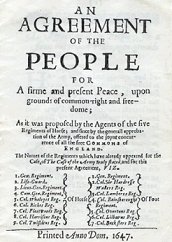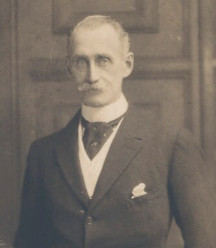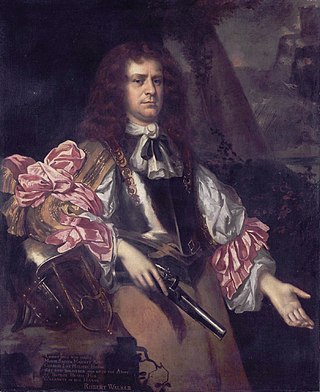
The Levellers were a political movement active during the Wars of the Three Kingdoms who were committed to popular sovereignty, extended suffrage, equality before the law and religious tolerance. The hallmark of Leveller thought was its populism, as shown by its emphasis on equal natural rights, and their practice of reaching the public through pamphlets, petitions and vocal appeals to the crowd.

John Lilburne, also known as Freeborn John, was an English political Leveller before, during and after the English Civil Wars 1642–1650. He coined the term "freeborn rights", defining them as rights with which every human being is born, as opposed to rights bestowed by government or human law. In his early life he was a Puritan, though towards the end of his life he became a Quaker. His works have been cited in opinions by the United States Supreme Court.

Marquess of Linlithgow, in the County of Linlithgow or West Lothian, is a title in the Peerage of the United Kingdom. It was created on 23 October 1902 for John Hope, 7th Earl of Hopetoun. The current holder of the title is Adrian Hope.

General Sir Hector Munro, 8th Laird of Novar, KB was a Scottish army officer and politician who served as the ninth Commander-in-Chief of Bengal from 1764 to 1765.
Lieutenant-Colonel The Honourable Douglas George Carnegie was a British politician who was Conservative Member of Parliament for Winchester from 1916 to 1918.

Lieutenant-Colonel George John Carnegie, 9th Earl of Northesk DL was a British nobleman and soldier.
Richard Overton was an English pamphleteer and Leveller during the Civil War and Interregnum (England).
This is a list of people who have served as Lord Lieutenant of Cleveland from the county's creation in 1974 until the abolition of the Lord Lieutenancy in 1997:

The Leveller was a British political magazine, collectively produced in London from 1976 to 1983 by a shifting coalition of radicals, socialists, Marxists, feminists, and others of the British left and progressive movements. It was published during the years of the Labour government of James Callaghan and the beginning of the era of the Conservative administration of Margaret Thatcher. This period was also noted for punk rock, Rock Against Racism and the Anti-Nazi League.

An Agreement of the People was a series of manifestos, published between 1647 and 1649, for constitutional changes to the English state. Several versions of the Agreement were published, each adapted to address not only broad concerns but also specific issues during the fast changing revolutionary political environment of those years. The Agreements of the People have been most associated as the manifestos of the Levellers but were also published by the Agitators and the General Council of the New Model Army.

Lieutenant-Colonel Henry Gilbert Ralph Nevill, 3rd Marquess of Abergavenny DL, styled Lord Henry Nevill between 1876 and 1927, was a British peer.

Banner Carruthers Johnstone was a British oarsman who competed in the 1908 Summer Olympics.

Lieutenant-Colonel George Joyce was an officer and Agitator in the Parliamentary New Model Army during the English Civil War.
William Eyre may refer to:
Phil Johnstone was an English songwriter, keyboardist, guitarist, and record producer, best known for his work with singer Robert Plant. His songwriting credits include Plant's number-one Mainstream Rock hits "Heaven Knows", "Tall Cool One" and "Hurting Kind ".

Lieutenant-Colonel Sir Walter Edgeworth-Johnstone was an Irish sportsman and police official who held the Amateur Boxing Association of England 1895 and 1896 heavyweight titles. He was chief commissioner of the Dublin Metropolitan Police from 1915 to 1923.
James Johnston was a general of the British Army, colonel of the Royal Horse Guards then colonel of the Scots Greys where he succeeded his sister's husband, George Preston.
The 1940 Birthday Honours were appointments by King George VI to various orders and honours to reward and highlight good works by citizens of the British Empire. The appointments were made to celebrate the official birthday of The King, and were published on 9 July 1940.
The New Year Honours 1896 were appointments by Queen Victoria to various orders and honours to reward and highlight good works by members of the British Empire. They were published on 1 January 1896.
Major-General George Johnstone was a British Army officer. He was commissioned into the infantry 1780, serving in Grenada during Fédon's rebellion in 1795-96. He was afterwards transferred to command a regiment of fencibles in New Brunswick, where he served for a year as acting Lieutenant Governor. In 1810, he was given command of a Highland regiment which served on garrison duty in Cape Colony. Johnstone was promoted to major general in 1814 and given command of the 6th Brigade in the 1815 Waterloo campaign. His brigade was not engaged in the 18 June Battle of Waterloo as they were posted to the extreme right flank, protecting the approaches to Brussels and Ostend. His men fought in the subsequent advance to Paris and helped to storm the fortress of Cambrai on 24 June.









